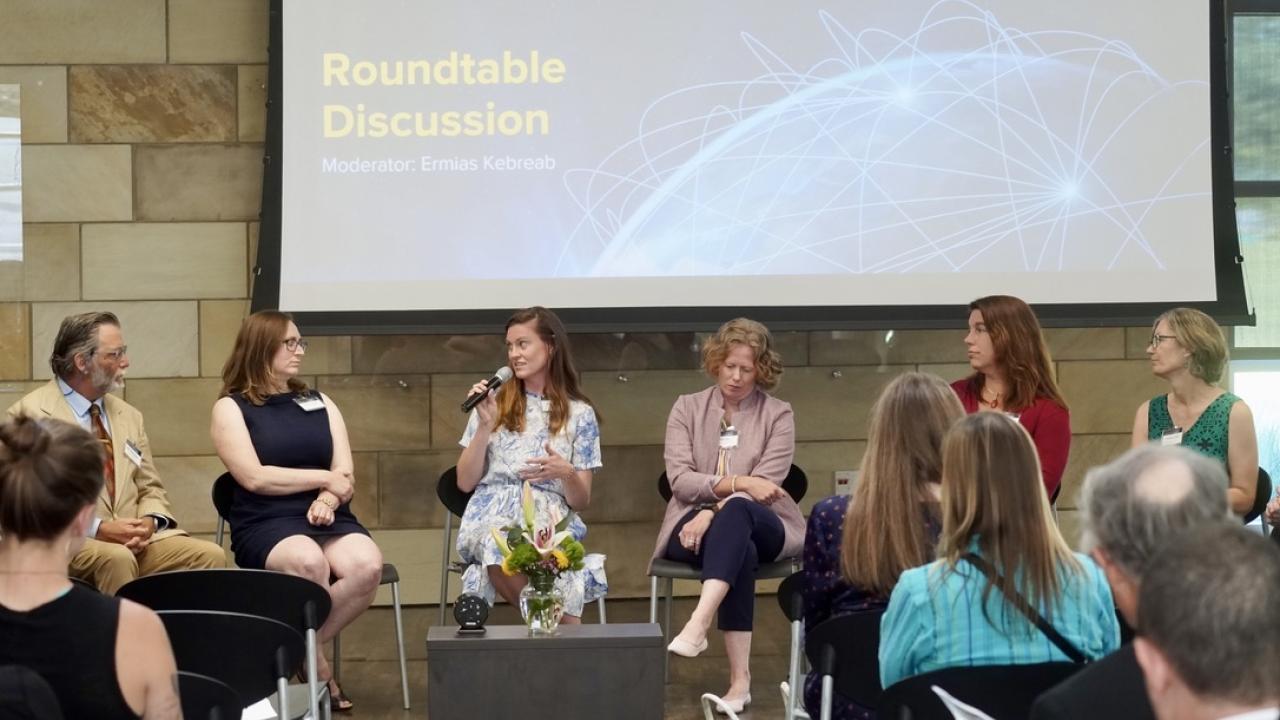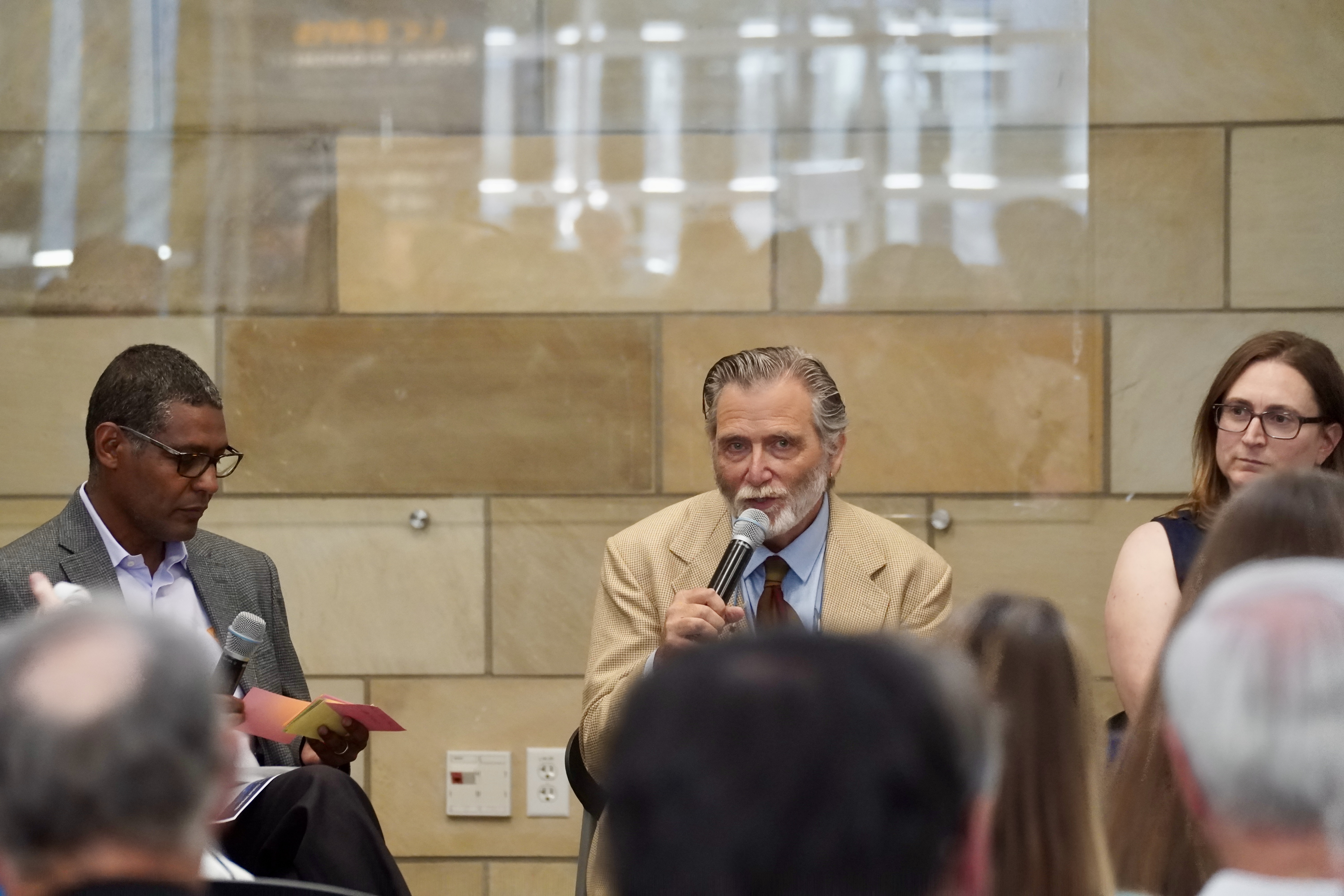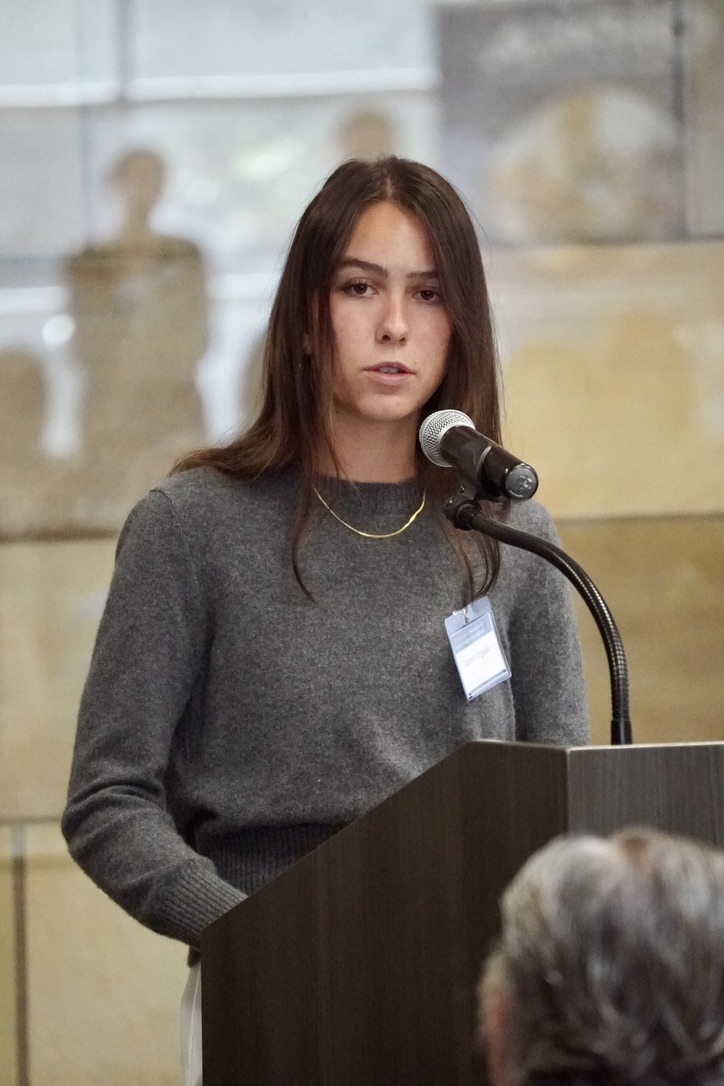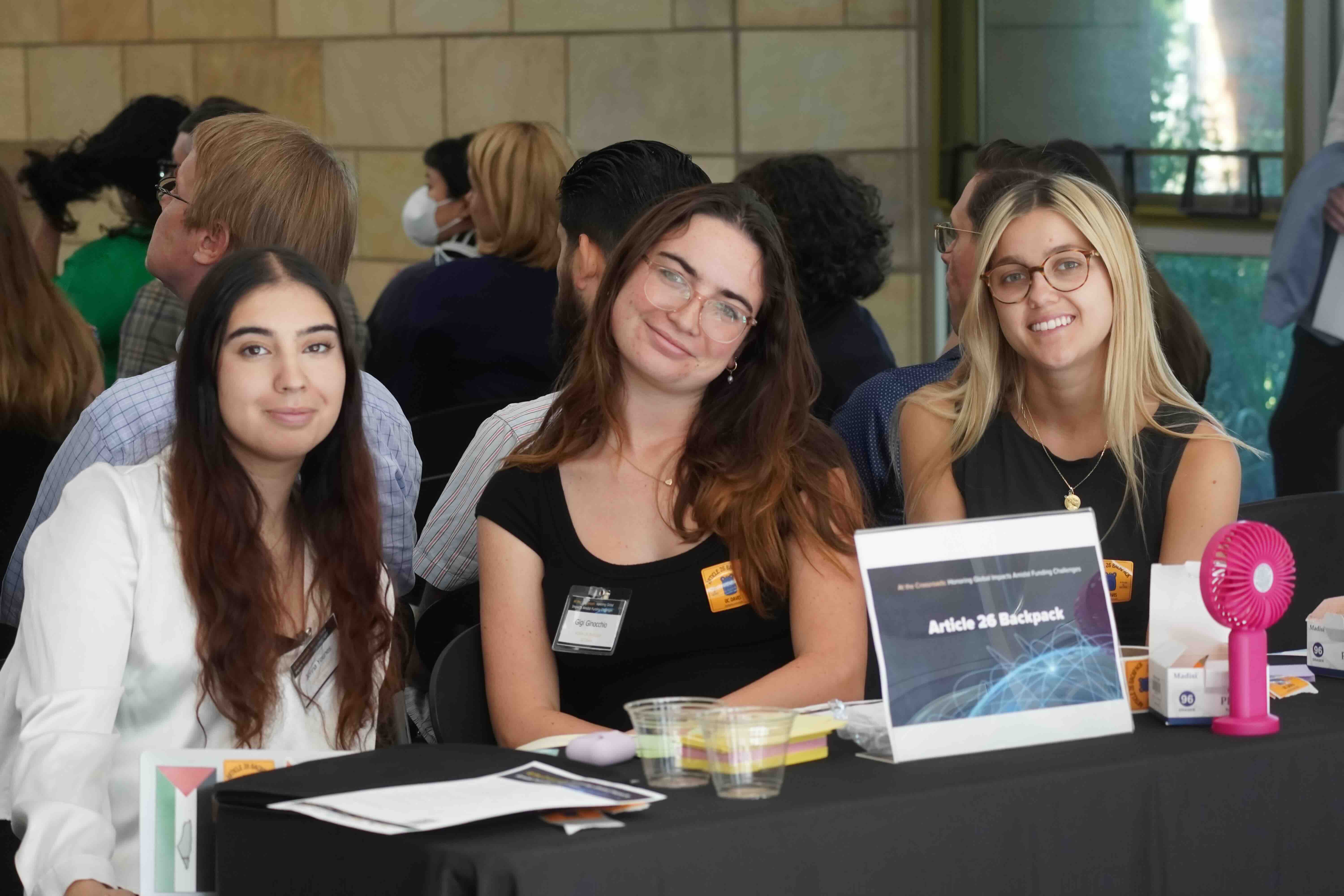
At the Crossroads: Honoring Global Impacts Amidst Funding Challenges
UC Davis’ international development and human rights projects eliminated by the illegal dismantling of USAID gather to explain what is lost and what is the path to repair
What has been lost and what is the path to repair? On a warm afternoon at the directors of the seven international development and human rights projects eliminated by the illegal dismantling of USAID gathered to explain the value of these projects to the American people and the world. With Chancellor Gary may, Provost Croughan and representatives from both the California Assembly and Congress in attendance, my colleagues and I explained how these projects address food insecurity, infant health, the training of health and water resource professionals and the protection and promotion of the human right to education for refugees and displaced peoples. Below are the comments of Professor Keith David Watenpaugh and Lauren Cegelski
Securing Documents/Securing Futures: The UC Davis Article 26 Backpack
Keith David Watenpaugh
Professor and Director, Human Rights Studies
Thank you Professor Stewart. Chancellor May, Provost Croughan. As my colleagues and I were preparing ourselves for this event, we set ourselves the task of explaining what has been lost and to imagine ways to build forward.
With the loss of USAID funding for the UC Davis Article 26 Backpack for Burma Project we are now unable to continue our collaboration with the Institute of International Education to implement the Lincoln Scholarship Program among Burmese young people fleeing oppression in their homeland of Myanmar. The goal of those scholarships was to empower and train hundreds of Myanmar’s next generation of democratic leaders at universities in SE Asia.
Our job was to provide the Backpack opportunity to all of those Lincoln scholars as well as 10,000 other displaced young Burmese, some living in UNHCR refugee camps on the Thai/Myanmar border or in Bangladesh.
Backpack is a simple yet elegant digital humanities tool that sits at the center of a global community of students, educators, and relief NGOs to ensure that young refugees and at-risk university professionals can continue their education, preserve their research and creative work, or seek employment without the fear that lost, stolen or inaccessible academic documents — diplomas, transcripts, letters of recommendation — will prevent them from doing so. Backpack began as a solution to a problem we found conducting Human Rights Studies research among Syrian refugee university students in camps and refugee ghettos throughout the Middle East and Southeastern Europe a decade ago. Talking with them, we learned that they lived in constant fear that they might lose evidence of their academic achievements and they told us of dangerous journeys to their homeland to retrieve documents demanded by university officials. We knew that we had the ingenuity and reach at UC Davis to take this whole problem — the safety and security of academic documents — off the table for them and make a practical contribution to the exercise of the human right to education, globally.

With a half million dollar core grant from the Ford Foundation and in collaboration with UC Davis Information and Educational Technology, the American Association of Collegiate Registrars and Admissions Officers and the American University of Beirut, we built and implemented Backpack, first in the Middle East and then with additional philanthropy we translated it into nine languages and initiated global implementation.
Alongside NGO partners, we have deployed it throughout the world including: Afghanistan, Armenia, and Rwanda; we are working to support Palestinian students as Israel destroys their homeland, and here at home, students facing deportation. Just recently, we began a special initiative to reach out to non-citizen students in the US who could be arrested and deported for exercising their freedom of speech.
When I think about what is lost, it is more than just a grant to implement a project. Our work was part of a larger effort within USAID called the Democracy, Human Rights and Governance Program. The idea was to ensure that USAID’s investments on behalf of the American people in health, education, and economic and social development abroad were intentionally linked to the promotion and protection of democracy and the growth of civil society. It was a recognition of a truism of international development: poverty is more than just a lack of resources or knowledge, it is also evidence of a deficit of human rights. The new program took a multi-pronged approach: building democratic resilience; advancing social and political inclusion, including that of women and minoritized communities; connecting climate action to positive political change; and employing technology to respond to crises, confront corruption, and counter digital repression — that’s where Backpack fit in.
When USAID was closed down, the power of America’s international development infrastructure to foster democracy and human rights was lost with it. Now with plans to eliminate the Department of State’s Bureau of Democracy, Human Rights, and Labor these goals will no longer be part of our foreign policy and the exercise of soft power.
So what we at UC Davis lost was our collective capacity as a university to stand in solidarity with, and provide practical human rights assistance to young people, half a world away, as they stand for democracy and against a genocidal régime. As a nation, we are losing the capacity, already quite limited and too often inconsistently implemented, to monitor and respond to international human rights challenges. So why is this important to us? The case for the promotion of human rights on an ROI basis is easily made: countries that uphold human rights are peaceful and prosperous, they make good allies and even better trading partners. Their citizens do not try to cross our borders illegally and they certainly have no interest in making war on us. Equally, the current administration’s antagonism towards the promotion of human rights abroad will be paralleled by the further erosion of our human rights at home. Our challenge is clear, universities, including UC Davis must be prepared to act with courage and integrity and seize the opportunity to address human rights needs through all facets of our mission: our public scholarship, our teaching, our basic research, and our civic engagement..
It is now my pleasure to introduce Ms. Lauren Cegelski, lead student intern on the Backpack project, a job we call in Backpack’s argot Chief Backpack Guide, to talk more about the impact of the loss of USAID on our work here at UC Davis. She will explain how through the work of the Human Rights Studies Program and Backpack we have already begun to meet the challenge.
Lauren E. Cegelski
Lead Backpack Guide '24-'25
Thank you Professor Watenpaugh. Chancellor May, Provost Groughan
I am Lauren Elizabeth Cegelski. In four weeks, I will graduate from UC Davis with Honors, a double major in Economics and International Relations, and something I’m very proud of, a minor in Human Rights. For the past year, I've led the day-to-day operations of Backpack. This leadership role has placed me at the heart of UC Davis' joint effort with USAID and IIE, a mission dedicated to securing the fundamental human right to education for thousands of young Burmese refugees.

Like Professor Watenpaugh, I am here to explain what has been lost: The loss of this grant has dealt a significant blow to the university's ability to cultivate California’s next generation of human rights and international development leaders.
I arrived at UC Davis 4 years ago when we were just resuming in person instruction. My very first class in college was Professor Watenpaugh’s Human Rights One: Human Rights/Human Wrongs where I learned about Backpack and the research and leadership opportunities it provided. Each year since the Pandemic, UC Davis undergraduates have played a significant role in the global implantation of Backpack. Acting as a largely autonomous collective, the Backpack student interns manage a wide array of partnerships spanning from Burma, Armenia, Afghanistan to those in our own country..
To give you a sense of the skill development and career preparation of a Backpack Guide, let me tell you a little more about what I do. As a lead Backpack guide, I do more than administer a program. A unique and critical feature of the Backpack program, as envisioned by Dr. Watenpaugh, is its dual focus: building leadership opportunities for young people in marginalized communities abroad, while simultaneously fostering leadership development right here among UC Davis undergraduate students.
Backpack has provided me and a dozen or more undergraduates every year, with an unparalleled opportunity to identify and implement practical, tangible solutions to address the urgent human rights needs of refugee university students. This experience has shaped me professionally and reaffirmed my goal of a career in public service, likely in law. The practical experience of collaborating with my peers from Afghanistan, Burma, Armenia and elsewhere has been critical in broadening my worldview and has been a rewarding journey.
No other L&S-based program provides the wide-range of human rights research and training opportunities than Backpack. The training we've received through the program has been fundamental to the success of many of us. The track record of previous guides speaks for itself: among our number is a University Medalist, and a winner of the prestigious Mayhew Prize, the top prize of the College of L & S., and multiple post-graduate scholarship and fellowship recipients. After graduation our Guides pursue advanced degrees in international development, public health, and public policy at universities like Georgetown, UCLA, University of Washington, University of Colorado, and American University. Our alumni are making a real difference in higher education, social work, the State Department, and as former USAID contractors.

Despite this setback, the strong relationships we've built are a testament to the program's impact. We have been working, scraping together whatever funds we can to salvage critical components of the project. However, without broader, sustained funding, the intended impact of Backpack simply cannot be fully realized. More than that, without expanded funding, the very future of the Backpack project is at risk, jeopardizing our ability to meet the continuous and pressing needs of refugee and displaced young people who deserve the fundamental right to education.
The loss of this grant isn't just a loss for UC Davis; it diminishes our capacity to cultivate compassionate and skilled leaders who are ready to tackle some of the most pressing global challenges.
